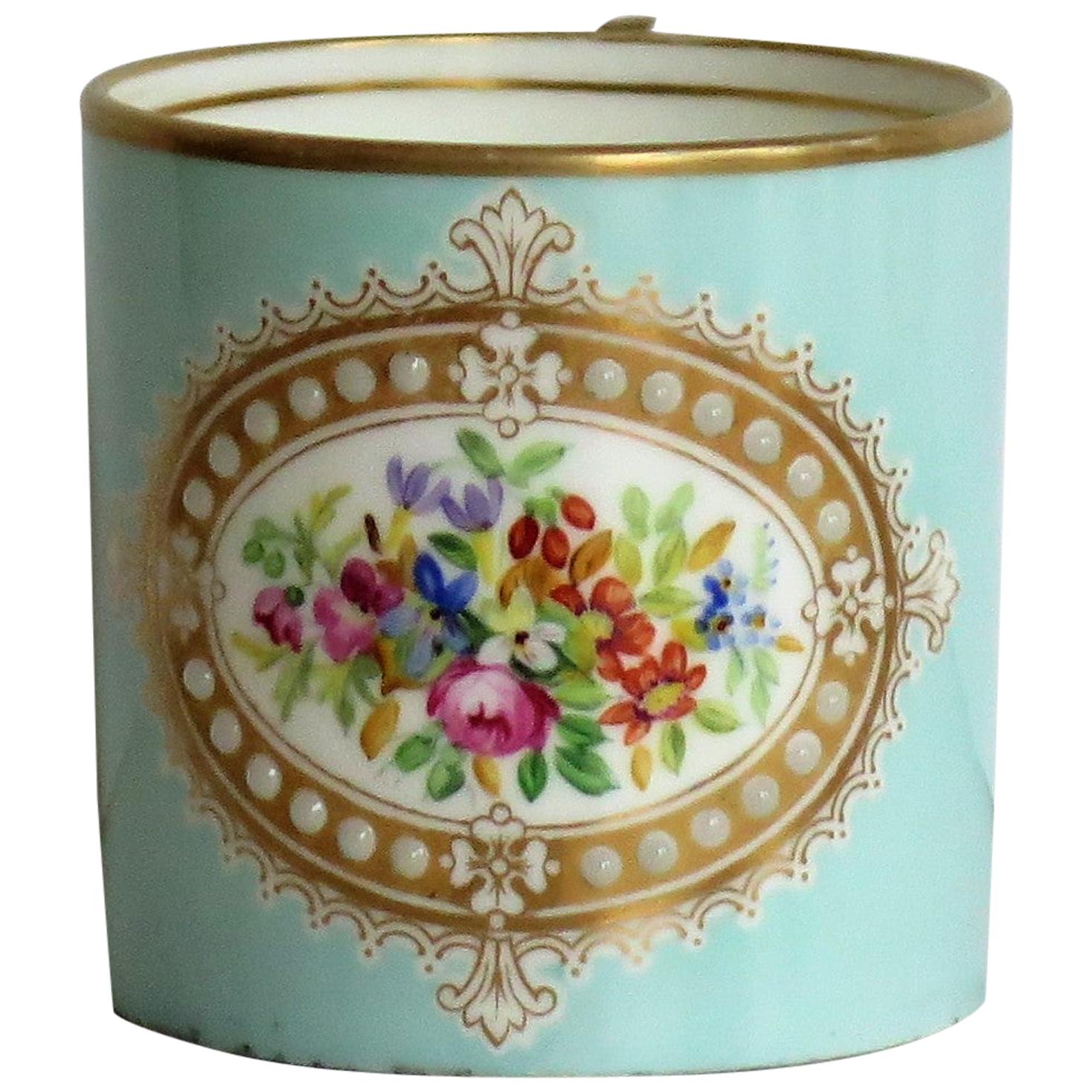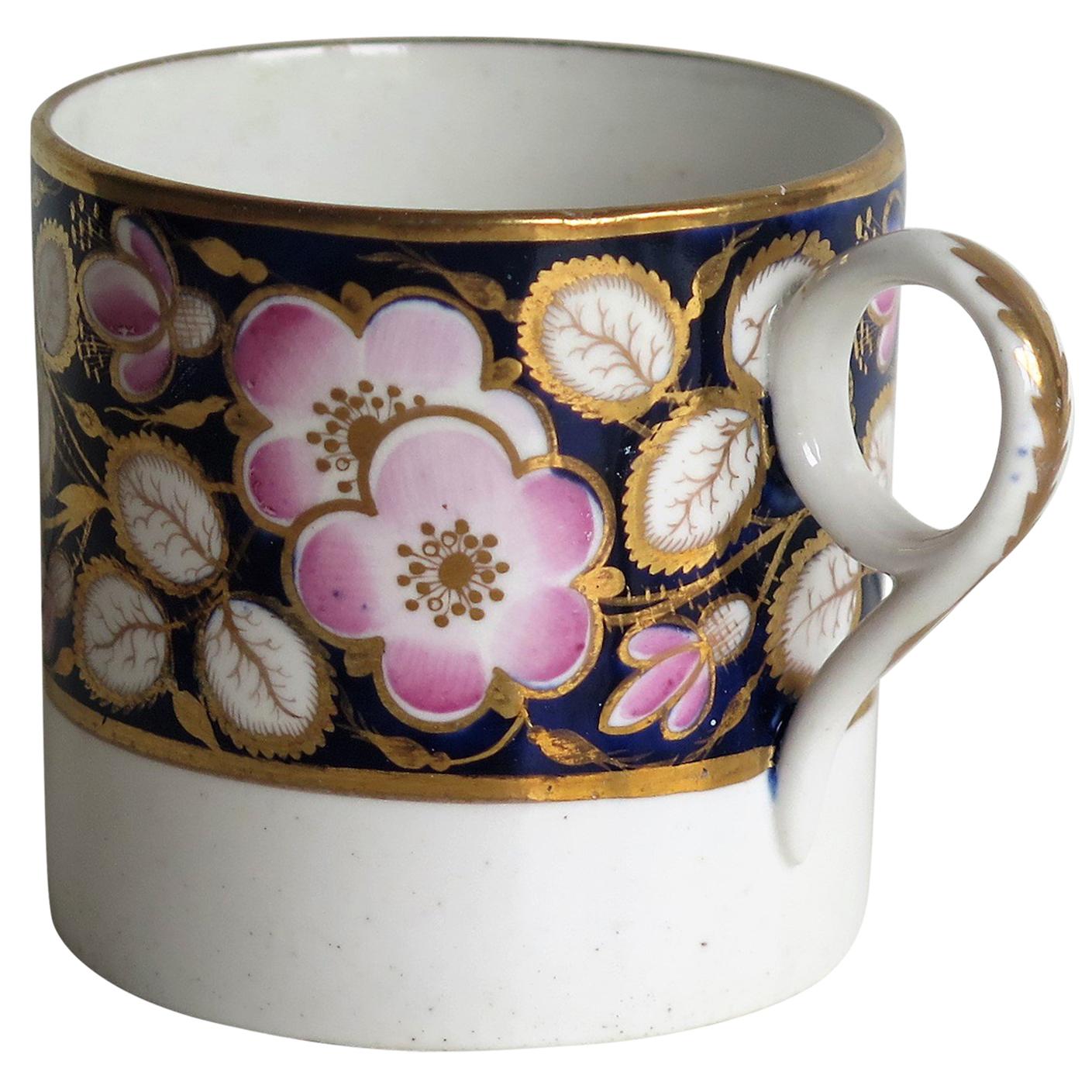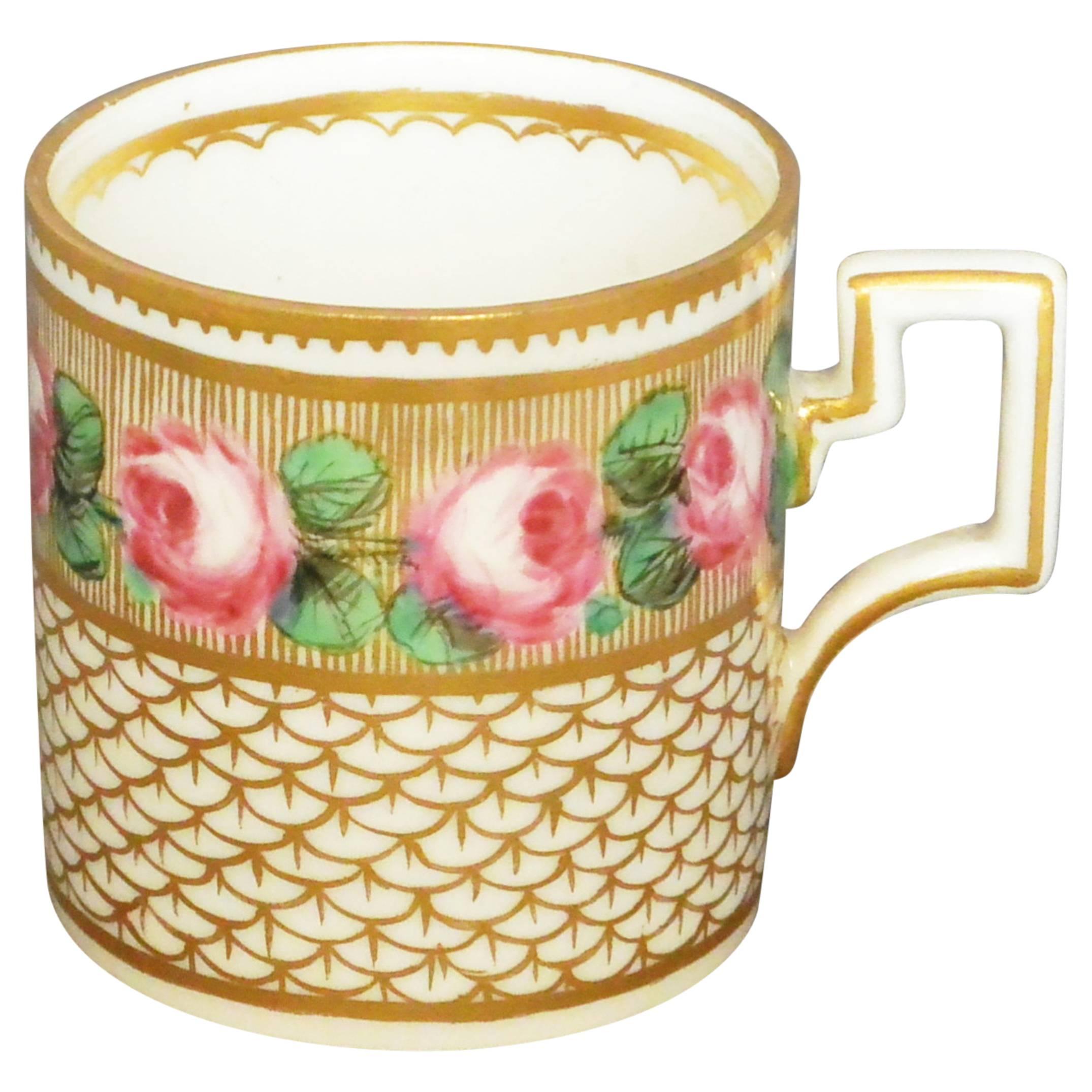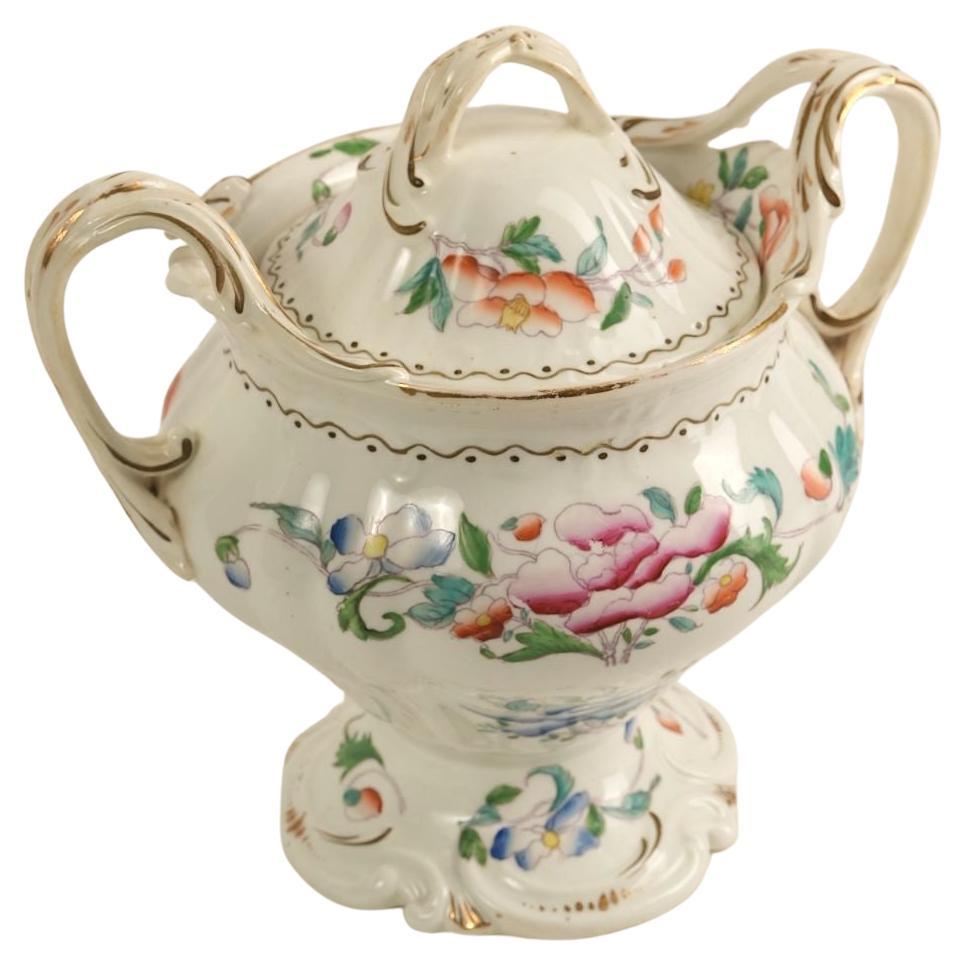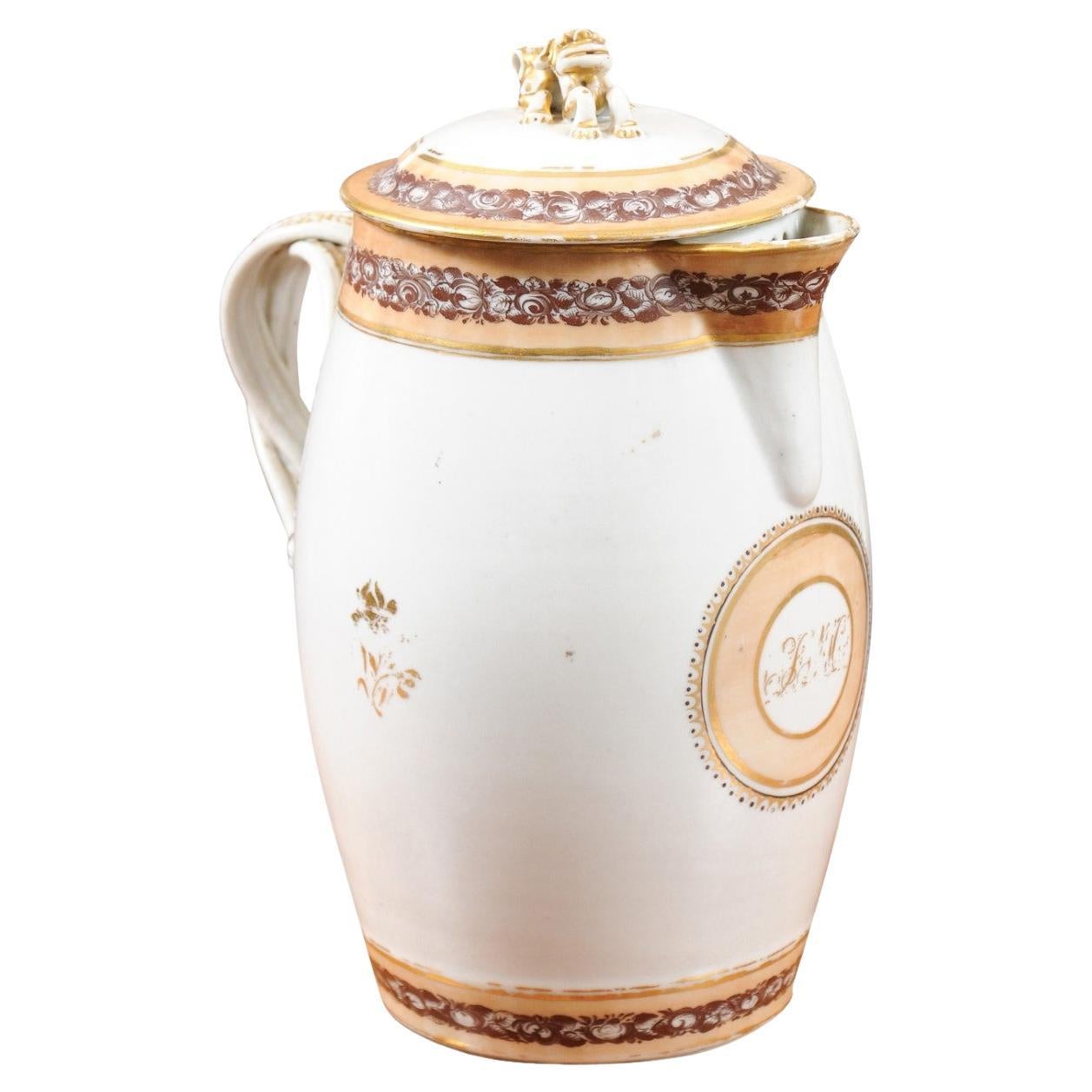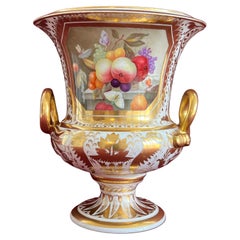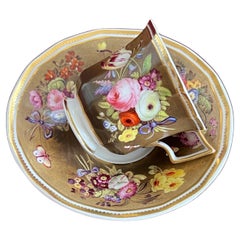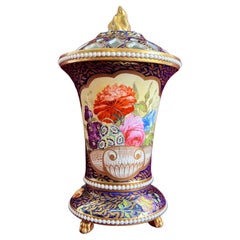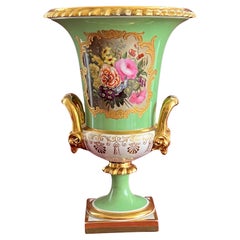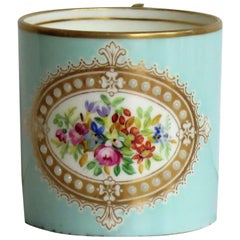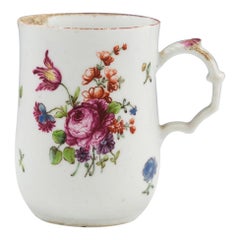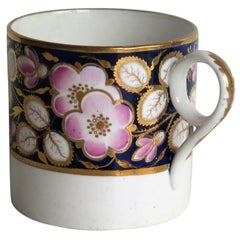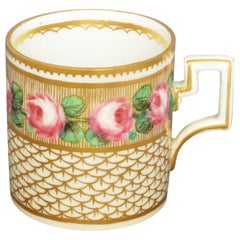Items Similar to Bloor Derby Porcelain Porter Mug in the Manner of Steel C.1820-1825
Want more images or videos?
Request additional images or videos from the seller
1 of 7
Bloor Derby Porcelain Porter Mug in the Manner of Steel C.1820-1825
$1,383.66
$1,729.5720% Off
£1,000
£1,25020% Off
€1,184.47
€1,480.5820% Off
CA$1,894.36
CA$2,367.9520% Off
A$2,100.99
A$2,626.2420% Off
CHF 1,103.34
CHF 1,379.1720% Off
MX$25,801.64
MX$32,252.0520% Off
NOK 13,967.19
NOK 17,458.9920% Off
SEK 13,171.25
SEK 16,464.0620% Off
DKK 8,837.43
DKK 11,046.7920% Off
Shipping
Retrieving quote...The 1stDibs Promise:
Authenticity Guarantee,
Money-Back Guarantee,
24-Hour Cancellation
About the Item
A fine Bloor Derby Porcelain porter mug c.1820-1825, finely decorated in the manner of Thomas Steel with a rectangular panel of flowers in a basket on a stone ledge, with a lime green ground beneath a gilt leaf scroll. Printed roundel mark in red.
Condition: Excellent.
- Creator:Bloor Derby (Manufacturer)
- Dimensions:Height: 4.73 in (12 cm)Diameter: 4.73 in (12 cm)
- Materials and Techniques:
- Place of Origin:
- Period:
- Date of Manufacture:1820
- Condition:
- Seller Location:Exeter, GB
- Reference Number:1stDibs: LU6712233946972
About the Seller
4.0
Vetted Professional Seller
Every seller passes strict standards for authenticity and reliability
1stDibs seller since 2022
18 sales on 1stDibs
- ShippingRetrieving quote...Shipping from: Exeter, United Kingdom
- Return Policy
Authenticity Guarantee
In the unlikely event there’s an issue with an item’s authenticity, contact us within 1 year for a full refund. DetailsMoney-Back Guarantee
If your item is not as described, is damaged in transit, or does not arrive, contact us within 7 days for a full refund. Details24-Hour Cancellation
You have a 24-hour grace period in which to reconsider your purchase, with no questions asked.Vetted Professional Sellers
Our world-class sellers must adhere to strict standards for service and quality, maintaining the integrity of our listings.Price-Match Guarantee
If you find that a seller listed the same item for a lower price elsewhere, we’ll match it.Trusted Global Delivery
Our best-in-class carrier network provides specialized shipping options worldwide, including custom delivery.More From This Seller
View AllFine Derby Porcelain Vase C.1815 Decorated in the Manner of Thomas Steele
By Derby
Located in Exeter, GB
A very fine Derby porcelain campana shaped vase c.1815. Beautifully painted with two panels of fruit in the manner of Thomas Steele. This artist was one ...
Category
Antique 1810s English Vases
Materials
Porcelain
$1,383 Sale Price
20% Off
A Spode porcelain Coffee Cup and Saucer very finely decorated c.1830
By Spode
Located in Exeter, GB
A fine Spode porcelain coffee cup and saucer c.1830. Although the cup has twelve sides, it is still called 'Octagon' shape, which was introduced by Spode 1829.
Very finely decorated...
Category
Antique 19th Century European Porcelain
Materials
Porcelain
$719 Sale Price
20% Off
Spode Porcelain Beaded Pot Pourri Vase C.1820-1825
By Spode Felspar
Located in Exeter, GB
A fine Spode Porcelain beaded Pot Pourri vase c.1820-1825. Of flared trumpet shape, embossed with three bands of pearls, resting upon three gilded paw feet, the pierces cover with fl...
Category
Antique 19th Century English Porcelain
Materials
Porcelain
$1,826 Sale Price
20% Off
A Flight, Barr & Barr Worcester Porcelain Campana shape Vase c.1825
By Flight, Barr & Barr Worcester
Located in Exeter, GB
A Flight, Barr & Barr Worcester Porcelain vase c.1825-1835. Of inverted bell shape, decorated with afinely painted panel of flowers by Samuel Astles with raised and tooled gilding, f...
Category
Antique 19th Century British Porcelain
Materials
Porcelain
$2,490 Sale Price
20% Off
Wonderful Minton Bone China Vase Decorated by Jessie Smith C.1850
Located in Exeter, GB
A wonderful Minton bone china vase c.1850. Superbly painted round the body with studies of roses in the manner of Jessie Smith. Small ermine-device m...
Category
Antique 19th Century Porcelain
Materials
Porcelain
$1,927 Sale Price
20% Off
Flight Barr and Barr Worcester Coffee Can and Saucer C.1815-182
By Flight, Barr & Barr Worcester
Located in Exeter, GB
A Flight Barr and Barr Worcester Porcelain coffee can and Saucer c.1815-1820. Finely decorated with a bold Japan pattern.
Condition: ...
Category
Antique 19th Century British Porcelain
Materials
Porcelain
$525 Sale Price
20% Off
You May Also Like
French Sevres Style Jewelled Porcelain Coffee Can Hand Painted Flowers, Ca 1810
By Manufacture Nationale de Sèvres
Located in Lincoln, Lincolnshire
This is a very beautiful jewelled coffee can all hand painted and gilded in the French Sevres style, possibly made by them and dating to the early 19th century, circa 1810.
This c...
Category
Antique Early 19th Century French Ceramics
Materials
Porcelain
$192 Sale Price
71% Off
A Longton Hall Porcelain Mug, c1760
By Longton Hall
Located in Tunbridge Wells, GB
A Longton Hall Porcelain Mug, c1760
Additional information:
Date : Circa 1760
Period : George 11 or George 111
Marks :None
Origin Longton, Staffordshire:
Colour :Polychrome
Pattern ...
Category
Antique 18th Century English George II Porcelain
Materials
Porcelain
Rare Georgian Porcelain Coffee Can by Machin & Baggaley Ptn 262, Circa 1810
By Machin and Baggaley
Located in Lincoln, Lincolnshire
This is an early 19th century porcelain coffee can or cup that we attribute to Machin and Baggaley (or Machin & Co.) of Burslem, Staffordshire, England.
Early Machin porcelain pieces tend to be rare.
This coffee can is nominally straight sided and has a good ring handle with a long pointed lower support. It is beautifully hand decorated with a striking floral design having large pink flowers...
Category
Antique Early 19th Century English George III Porcelain
Materials
Porcelain
$177 Sale Price
53% Off
Italian Gilt Porcelain Cup
By Real Fabbrica Ferdinandea 1
Located in New York, NY
Italian gilt porcelain cup. Real Fabbrica Ferdinandea hand-painted demitasse cup with rose painted surround above a gilt fish-scale. Band with gilt rim ...
Category
Antique Late 18th Century Italian Serving Pieces
Materials
Porcelain
Hand-Painted Porcelain Sugar Bowl with Lid, c. Early 20th Century
Located in Worcester Park, GB
What makes this piece unique is its remarkable combination of ornate form and delicate hand-painted florals — a true testament to early 20th-century European porcelain craftsmanship....
Category
Early 20th Century English Rococo Revival Tableware
Materials
Porcelain
Large 18th Century Chinese Export Porcelain Mug with Lid
Located in Atlanta, GA
Large 18th Century Chinese Export Porcelain Mug with Lid
Category
Antique 18th Century Chinese Porcelain
Materials
Porcelain
More Ways To Browse
Lime Green Stone
Stone Flower Basket
Derby Bloor
Porter Mug
Bjorn Wiinblad Plate
English Imari Porcelain
Limoges Yellow
Vintage Crown Royal Glasses
Imari Japan Mark
Royal Sword
Saxony Porcelain
French Soup Bowl
Porcelain Cake Plates
Porcelain Vienna Flowers
Silver Rim Set Of China Plates
Antique French Porcelain Dishes
English Porcelain Chinoiserie
Flower Porcelain Tray
